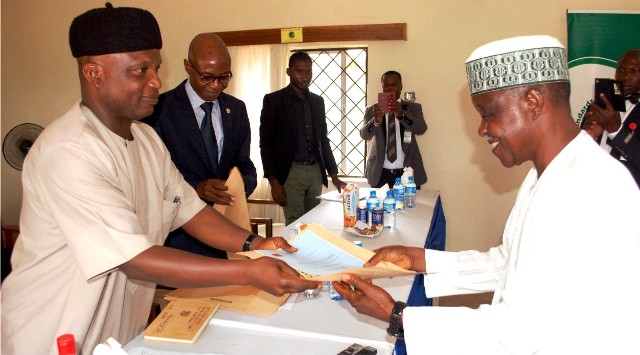Business
Climate Change: Nigeria To Inaugurate Green Bond

Acting President, Prof. Yemi Osinbajo has said that the Federal Government was making arrangements to inaugurate the first African Sovereign Green Bond to address climate change and environmental projects.
Osinbajo said this at the Green Bonds Capital Market & Investors Conference organised by the Federal Ministry of Environment and the Debt Management Office (DMO) at the Nigerian Stock Exchange (NSE) office in Lagos, Thursday.
Green Bonds are debt instruments tied to environmental projects to address climate change.
He said that the Federal Government under the Green Bonds initiative would give N20 billion under the first tranche before the end of the first quarter through the nation’s bourse.
Osinbajo, who described the initiative as a new addition to the market funding portfolio, stated that the proceeds would be used to fight climate change.
He said that climate change had led to more natural disasters, thereby impacting negatively on food, water and energy supply.
The acting President said that the initiative would also provide an opportunity to deepen the capital market as well as tackle poverty.
According to Osinbajo, the bond issuance will support the Federal Government’s shift to non-oil base assets for project financing for economic growth and development.
He said that the proceeds of the bonds would be used for environmental projects such as renewable energy micro-utilities in three communities estimated at N10 billion.
Besides, he said it would as well provide an average of 33KW of power through solar technology.
Osinbajo noted that power had posed a major challenge in the nation’s universities, adding that 37 federal universities and seven teaching hospitals would benefit from the Energizing Education Programme (EEP).
He stated that the EEP project estimated to cost 213 million dollars would provide119 mega watts of power in 37 universities using off grid solar technology.
According to him, Nigerians should embrace the bond initiative, the first in Africa to benefit from its higher yields. Osinbajo, who commended the ministries of Finance and Environment for the foresight in putting the bonds together, said the initiative would attract more private sector participation to the market.
Also speaking, Mrs Amina Mohammed, Minister of Environment, said that the project was in line with the Federal Government’s sustainable development initiative borne in September 2016.
Mohammed said the government, under its recovery growth plan initiative, identified Green Bonds as a vehicle that could be used to drive the economy in terms of environmental projects funding.
She said that the bonds if properly harnessed would create new jobs, open new investment avenues for the country as well as ensure creative thinking.
Mohammed stated that the proceeds would be invested in critical social-economic and environmental sectors that would impact on the lives of common Nigerians.
She said that the domestic investors needed to rally round the issuance to ensure its success in order to support government diversification agenda.
The minister said that the bond’s proceeds would be managed by DMO.
Mr Babatunde Fashola, Minister of Power, Works and Housing, said that the initiative was borne based on extensive consultation.
Fashola said that the DMO would determine the amount that would be used for all projects earmarked under the Green Bonds.
He said that Nigeria was working toward achieving 30 per cent in renewable energy by 2030, adding that Solar Unit Distribution Programme (SUDIP) project was estimated to cost N1.3 billion.
According to him, the units in aggregate from the project will provide up to 12mws of power, creating 6,000 jobs and impacting at least 60,000 persons.
Transport
Automated Points Concession : FAAN Workers Gave 72hrs To Revise Decisions In PH

Transport
FAAN Announces Pick-Up Points for Go-Cashless Cards

Business
Fidelity Bank To Empower Women With Sustainable Entrepreneurship Skills, HAP2.0
-
Politics4 days ago
2027: NIGERIANS FAULT INEC ON DIGITAL MEMBERSHIP REGISTER DIRECTIVE
-

 Environment4 days ago
Environment4 days agoLAWMA Director Says Sweeping Reforms Have Improved Waste Collection
-
Politics4 days ago
LP Crisis: Ex-NWC Member Dumps Dumps Abure Faction
-

 Politics4 days ago
Politics4 days agoUmahi Dismisses Allegations On Social Media, Insists On Projects Delivery
-

 Sports4 days ago
Sports4 days agoAbia Not Sure To Secure continental Ticket
-
Politics4 days ago
NATASHA ELECTRIC VEHICLES INITIATIVE IN KOGI CENTRAL
-
Sports4 days ago
La Liga: Yamal Records First Career Hat-trick
-

 Sports4 days ago
Sports4 days agoPSG Extend Lead In Ligue 1

